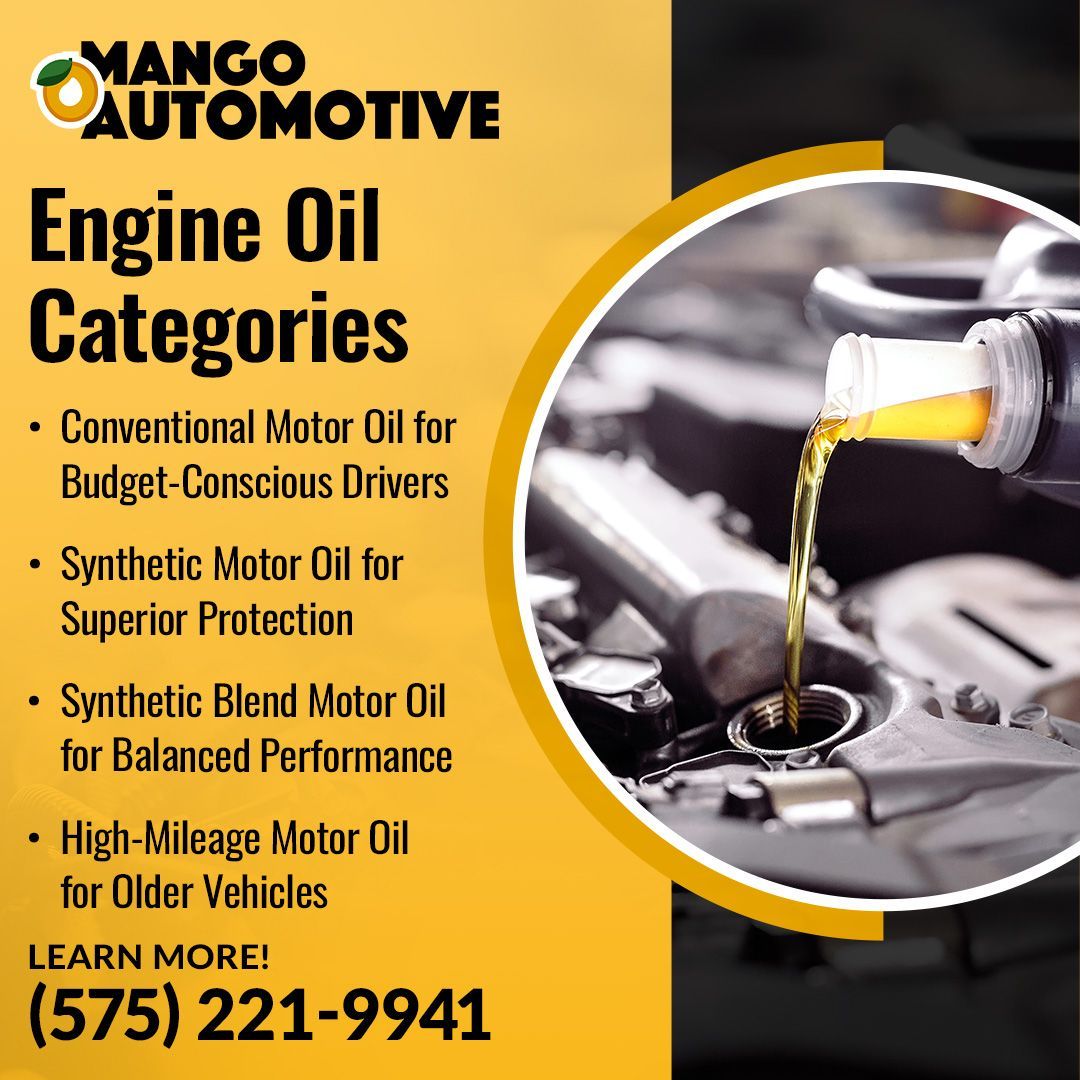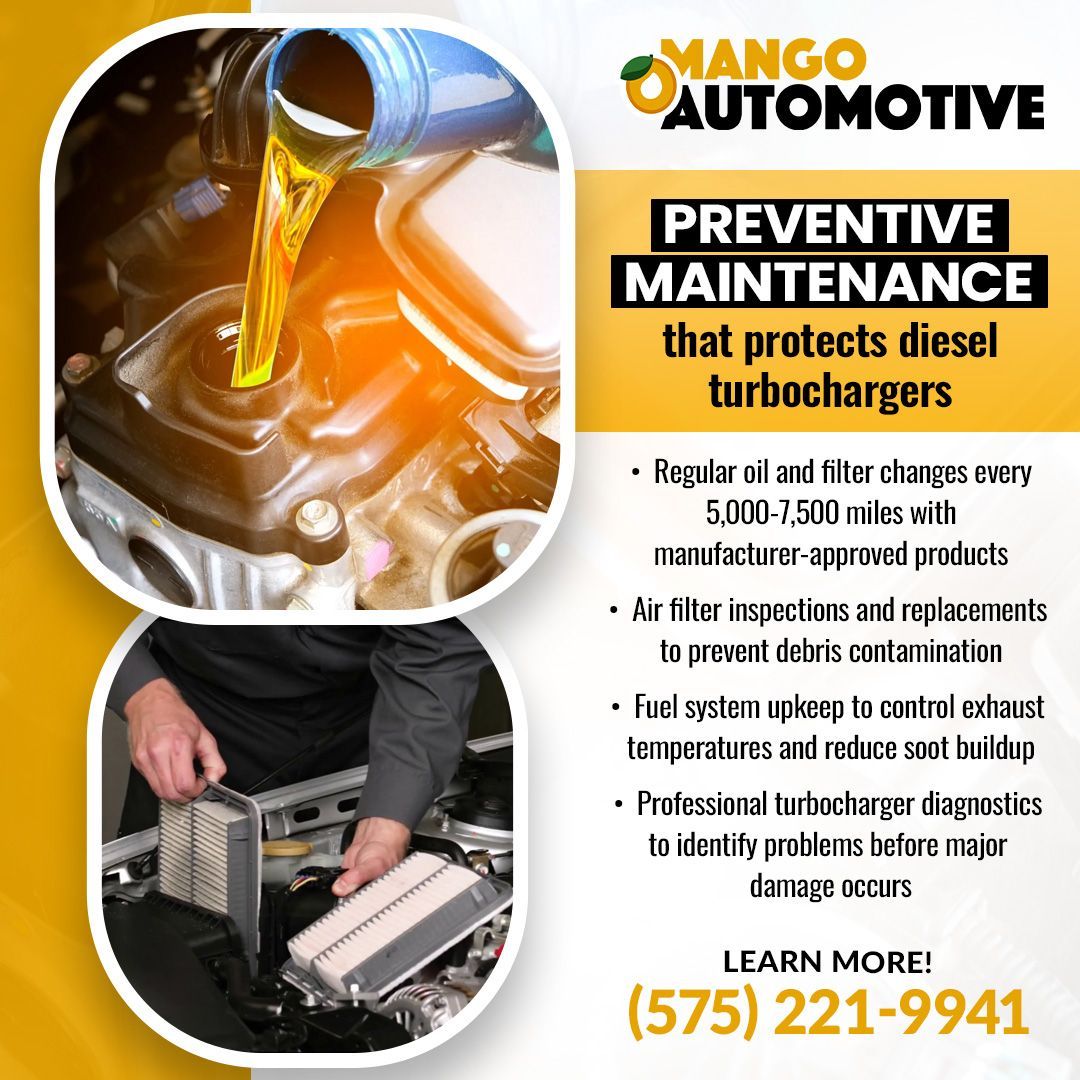Engine Lubricants Explained: Las Cruces Auto Repair Shop's Guide to Oil Selection
Engine oil failures cost Las Cruces drivers thousands of dollars in preventable repairs every year. Vehicle owners face a confusing marketplace filled with conventional, synthetic, synthetic blend, and high-mileage oils, each claiming superior protection. Without proper guidance, drivers either overpay for unnecessary premium oils or choose inadequate lubricants that fail to protect their engines during extreme desert heat, frequent stop-and-go traffic, or high-mileage conditions. At Mango Automotive & Diesel, we see the expensive consequences of wrong oil choices – seized engines, premature wear, and costly repairs that could have been avoided with proper lubricant selection.
The decision between oil types directly impacts your vehicle's lifespan, maintenance costs, and reliability on Las Cruces roads. Desert temperatures reaching over 100°F, combined with dusty conditions and varying altitudes, create unique challenges that standard oil recommendations may not address. Our
auto repair experts help customers avoid costly mistakes and maximize their engine's performance and longevity with the right choice of engine lubricant that matches their specific vehicle, driving conditions, and budget.

The Role of Engine Lubricants in Vehicle Performance
Engine lubricants serve three primary functions: reducing friction between moving parts, managing heat transfer, and removing contaminants from the engine system. The quality and type of lubricant directly affect engine performance, fuel efficiency, and longevity.
Friction Reduction and Heat Management
Engine oil reduces friction by creating a thin film between moving parts, while absorbing and transferring heat away from critical components.
Internal combustion engines generate tremendous friction as pistons move thousands of times per minute. Heat management becomes critical in Las Cruces' desert climate, where ambient temperatures exceed 100°F. Engine oil absorbs heat from combustion chambers and carries it to the oil pan, where it dissipates. Without adequate heat transfer, engine components expand beyond design tolerances, causing seizures and permanent damage.
Contaminant Removal and Engine Protection
Engine oil acts as a cleaning agent, capturing dirt, debris, and combustion byproducts before carrying them to the oil filter for removal.
Combustion creates microscopic particles, including carbon, metal shavings, and unburned fuel residue. Las Cruces drivers face additional contamination challenges from desert dust and sand. Quality lubricants contain detergent additives that suspend these particles, preventing them from settling and forming sludge deposits.
Why Choosing the Right Oil Matters
Improper maintenance, including wrong oil selection, accounts for a significant percentage of preventable engine failures. This makes proper lubricant choice critical for vehicle reliability.
Engine manufacturers specify oil requirements based on internal tolerances and operating temperatures. Using oil that doesn't meet these specifications can void warranties and cause expensive damage.
Conventional Motor Oil: Budget-Friendly Protection
Conventional motor oil is refined directly from crude oil and costs 50-70% less than synthetic alternatives while providing adequate protection for standard driving conditions. Conventional oil has historically dominated the market and works effectively in older vehicles and normal driving conditions.
Conventional oil performs well within specific temperature ranges but breaks down faster than synthetic alternatives under extreme conditions. Las Cruces summer temperatures above 100°F can accelerate oil degradation, requiring more frequent changes during hot weather months.
Best Applications for Conventional Oil
Older vehicles with higher mileage benefit from conventional oil's thicker consistency. Engines with looser tolerances due to wear perform better with conventional oil, as it fills gaps between worn components more effectively than thinner synthetic alternatives.
Simple engine designs without turbochargers or variable valve timing systems operate effectively with conventional oil. Normal driving conditions include regular highway commuting and infrequent stop-and-go traffic.
Cost and Value Considerations
Conventional oil costs less when compared to synthetic oil, but it requires changes every 3,000-5,000 miles versus 7,500-10,000 miles for synthetic alternatives.
The initial cost savings appeal to budget-conscious drivers. However, conventional oil requires more frequent changes, impacting total annual costs. Vehicles using conventional oil need service every 3,000-5,000 miles, meaning 4-5 oil changes per year for average drivers.
At our auto repair shop in Las Cruces, we help customers evaluate their specific situation, including vehicle age, annual mileage, and driving conditions, to determine whether conventional oil provides adequate protection and cost savings.
Synthetic Motor Oil: Superior Engine Protection
Synthetic motor oil is manufactured from chemical compounds rather than refined crude oil, providing improved thermal stability, better performance at extreme temperatures, and a service life up to three times longer than conventional oil. Synthetic oil offers superior performance in extreme temperatures and demanding driving conditions common in Las Cruces.
Performance Advantages Over Conventional Oil
Synthetic oil maintains better viscosity stability across a wider temperature range compared to conventional oil, providing superior protection in both extreme cold and high-heat conditions.
Temperature stability becomes vital in Las Cruces, where summer temperatures exceed 100°F, while winter mornings can drop below freezing. Synthetic oil flows immediately at startup, providing instant protection when conventional oil remains thick and slow-moving.
Synthetic motor oil can reduce internal engine friction considerably, resulting in
fuel economy gains of 1.8–5 % and reducing wear on engine components. Heat resistance prevents breakdown during extreme conditions like heavy towing or stop-and-go traffic.
Ideal Applications for Synthetic Oil
Synthetic oil is recommended for turbocharged engines, vehicles driven in extreme temperatures, and cars with extended drain intervals exceeding 7,500 miles.
High-performance engines generate more heat and operate under higher stress than conventional designs. Turbochargers can reach temperatures exceeding 1,000°F, requiring oil that maintains stability under extreme conditions. Vehicles driven in severe conditions benefit from synthetic oil's advanced protection.
While synthetic oil costs more per change than conventional oil, extended drain intervals reduce annual service frequency. At Mango Automotive & Diesel, we offer synthetic oil changes for Las Cruces vehicles, ensuring proper oil selection and professional service to protect your engine against extreme desert conditions.
Synthetic Blend Motor Oil: Balanced Performance
Synthetic‑blend motor oil combines about 20–30% synthetic oil with 70–80% conventional oil, delivering enhanced protection over conventional oil at a cost that’s typically 30–50% lower than full synthetic. This hybrid approach offers enhanced protection for moderate driving conditions while maintaining affordability for budget-conscious Las Cruces drivers.
Composition and Performance Benefits
Synthetic blend oil contains a conventional base oil enhanced with synthetic components to improve high-temperature stability and cold-weather flow characteristics.
The conventional oil portion provides cost-effective lubrication for normal operating conditions. The synthetic component enhances performance during temperature extremes and stress conditions. This combination creates a lubricant that outperforms conventional oil while costing considerably less than full synthetic alternatives.
Synthetic blend motor oil maintains stable viscosity across a broad range of temperatures, offering improved cold-start protection and high-temperature stability compared to conventional oil. This enhanced stability benefits Las Cruces drivers during the hot summer months when conventional oil breaks down faster. The synthetic component also improves cold-weather starting performance during winter mornings.
Synthetic blend motor oils offer greater resistance to thermal breakdown and high-temperature oxidation compared to conventional oils. Thus, it provides better protection during stop-and-go traffic, moderate towing, or extended highway driving. The synthetic additives prevent oil degradation and maintain protective properties longer than conventional alternatives.
Suitable Vehicle Applications
Synthetic blend oil works best in vehicles with 25,000-150,000 miles, moderate performance engines, and mixed driving conditions, including occasional severe use.
Vehicles in their prime operating years benefit most from synthetic blend protection. These cars typically have several years of remaining service life, but don't require the maximum protection of full synthetic oil. Moderate-mileage vehicles often experience mixed driving conditions that exceed conventional oil capabilities.
Engines that generate more heat and stress than simple designs, but don't require the extreme protection needed for high-performance applications, operate effectively with synthetic blend oil.
At our auto repair shop in Las Cruces, we recommend synthetic blend oil for customers seeking better protection than conventional oil without the premium cost of full synthetic.
High-Mileage Motor Oil: Specialized Protection for Older Engines
High-mileage motor oil is formulated specifically for vehicles with over 75,000 miles, containing seal conditioners that reduce leaks and oil consumption. This specialized lubricant helps extend engine life and maintain performance as components begin showing wear from years of operation.
Understanding Engine Aging and Seal Degradation
Engine seals and gaskets deteriorate over time due to heat cycles, pressure changes, and chemical exposure, leading to oil leaks and increased consumption.
As vehicles accumulate miles, rubber seals lose flexibility and develop cracks or shrinkage. This natural aging process affects valve cover gaskets, oil pan seals, and crankshaft seals. The result is visible oil leaks, increased oil consumption, and potential engine damage if not addressed.
Heat cycles from repeated warming and cooling cause seal materials to expand and contract thousands of times. Las Cruces' extreme temperature variations between day and night accelerate this process. Desert heat stresses aging seals, making high-mileage oil beneficial for older vehicles in our climate.
Seal-Conditioning Technology and Benefits
High-mileage oil contains seal conditioners that penetrate rubber seals, restoring flexibility and reducing leaks while preventing future degradation.
Seal conditioners work by softening aged rubber materials, helping them return to their original dimensions. This process can eliminate minor leaks and reduce oil consumption. The conditioners also prevent further seal degradation, extending the time before major repairs become necessary.
Enhanced viscosity improvers in high-mileage oil help maintain proper oil pressure in engines with increased tolerances. As engine components wear, gaps between parts increase, potentially causing low oil pressure. High-mileage oil's formulation compensates for these changes, maintaining adequate lubrication and protection.
Determining When to Switch to High-Mileage Oil
Vehicle owners should consider high-mileage oil when their car reaches 75,000 miles or shows signs of oil leaks, increased consumption, or blue exhaust smoke.
The 75,000-mile threshold represents the point where most vehicles begin experiencing age-related issues. However, driving conditions and maintenance history affect this timing. Vehicles driven in severe conditions or with poor maintenance may benefit from high-mileage oil earlier.
At Mango Automotive & Diesel, our auto repair technicians help Las Cruces drivers evaluate their vehicle's condition and determine the right time to switch to high-mileage oil. This assessment considers current oil consumption, visible leaks, and overall engine condition to make the best recommendation for each situation.
Choosing the Right Engine Oil for Your Vehicle
Selecting the appropriate engine oil requires evaluating four key factors: manufacturer specifications, driving conditions, vehicle age, and total cost of ownership. Making the right oil choice prevents costly engine damage while optimizing performance and maintenance costs.
Consulting Your Owner's Manual
Your vehicle's owner's manual specifies the exact oil viscosity grade, capacity, and performance standards required for warranty compliance and optimal engine protection.
Manufacturer specifications represent extensive testing to determine the right oil characteristics for your specific engine design. These recommendations consider internal tolerances, operating temperatures, and performance requirements. Using oil that doesn't meet these specifications can void warranties and cause expensive damage.
Evaluating Your Driving Conditions
Driving conditions, including frequent short trips, stop-and-go traffic, extreme temperatures, and dusty environments, affect Las Cruces drivers.
Normal driving conditions include regular highway commuting at steady speeds with moderate temperatures. Severe conditions encompass frequent short trips under four miles, stop-and-go traffic, extreme temperatures above 90°F or below 32°F, dusty environments, and towing or hauling.
Las Cruces drivers commonly experience multiple severe conditions simultaneously. Desert heat, frequent stop-and-go traffic, and dusty conditions create demands that exceed conventional oil capabilities. These factors may require upgrading to synthetic blend or full synthetic oil for adequate protection.
Vehicle Age and Climate Considerations
Vehicle age determines oil type compatibility, while Las Cruces' desert climate requires enhanced heat resistance and cold-weather flow characteristics.
Newer vehicles under 25,000 miles typically require manufacturer-specified oil to maintain warranty coverage. Vehicles between 25,000-75,000 miles benefit from synthetic blend or full synthetic oil. Vehicles over 75,000 miles should consider high-mileage oil if experiencing leaks or consumption issues.
Las Cruces' climate creates unique demands with summer temperatures exceeding 100°F and winter mornings dropping below freezing. This temperature range requires oil with superior thermal stability. Desert dust also increases filtration demands, making quality oil selection more critical.
Budget and Total Cost of Ownership
Total annual oil costs include purchase price, labor, and potential repair prevention, with synthetic oil often providing better value despite higher initial costs.
Conventional oil costs less per change when compared to synthetic oil, but requires service every 3,000-5,000 miles. Synthetic oil 7,500-10,000 miles. For drivers covering 15,000 miles annually, conventional oil requires 4-5 changes compared to 2-3 synthetic changes. Long-term engine protection adds significant value by preventing auto repairs and extending engine life. Quality oil prevents sludge buildup, reduces wear, and maintains performance.
At Mango Automotive & Diesel, our auto repair technicians consider all these factors when recommending the right engine oil for your specific vehicle and driving conditions.
Common Questions About Oil Changes in Las Cruces
Is synthetic oil worth the extra cost in our desert climate?
Yes. Synthetic oil holds up better against Las Cruces’ high summer temperatures and dusty roads. It also lasts longer, which means fewer oil changes each year. While the upfront price is higher, many drivers save money over time with better protection and fewer service visits.
Can I switch from conventional to synthetic oil?
Absolutely. Most vehicles can transition to synthetic oil without issue. In fact, many customers with older vehicles choose synthetic or synthetic blend oil to improve protection against heat and reduce engine wear.
Do older cars in Las Cruces really need high-mileage oil?
If your vehicle has more than 75,000 miles, high-mileage oil can help condition worn seals and reduce oil leaks, which are common in our hot climate. Our team can inspect your engine and let you know if switching makes sense.
How do I know if I’m using the wrong oil?
Some warning signs include increased engine noise, sluggish performance, blue exhaust smoke, or frequent oil top-offs. If you’re unsure, bring your car by, and we’ll check your oil type, condition, and filter to make sure everything matches your vehicle’s needs.
Professional Oil Change Services at Mango Automotive & Diesel
Mango Automotive & Diesel provides oil change services using quality lubricants and OEM-quality filters, backed by our 60-month/60,000-mile warranty. Professional oil changes involve more than simply draining old oil and adding new lubricant. Our Las Cruces auto repair technicians follow a systematic process to ensure the proper oil selection, installation, and vehicle inspection for proper engine protection.
Thorough Oil Change Process
Each oil change begins with inspecting your vehicle's current oil condition and checking for leaks or unusual wear patterns. Our auto repair technicians verify the correct oil type and viscosity for your specific vehicle, considering manufacturer recommendations and your driving conditions.
We safely dispose of used oil and filters according to environmental regulations. Our thorough inspection can identify potential issues before they become major problems and prevent costly auto repairs down the road.
Quality Oil and Filter Selection
We stock conventional, synthetic blend, full synthetic, and high-mileage oils from reputable manufacturers, plus OEM-quality filters.
Our filter selection includes options that meet or exceed original equipment specifications for adequate filtration and flow characteristics. We make sure the filter sizing and type are correct for your specific engine application, with premium filter options available for vehicles requiring enhanced protection.
VIP Membership Oil Services
VIP members receive free biannual oil changes, unlimited fluid top-offs, and priority scheduling.
The VIP Membership program at our
auto repair shop includes complimentary oil changes every six months, ensuring consistent engine protection. Members also receive unlimited fluid checks and top-offs, plus same-day service availability that minimizes schedule disruption.
Expert Advice and Recommendations
Our experienced Las Cruces auto repair technicians provide personalized oil recommendations based on your vehicle's specific requirements, driving conditions, and budget considerations.
We consider vehicle age, mileage, and manufacturer specifications when recommending oil types. Our team evaluates driving conditions and provides cost-benefit analysis to help you make informed decisions about oil selection and service intervals. We integrate oil changes into maintenance schedules to maximize vehicle reliability and minimize total ownership costs.
Your Trusted Las Cruces Auto Repair Partner
At Mango Automotive & Diesel, we combine experienced technicians, advanced diagnostic equipment, and a 60-month/60,000-mile warranty, making us the trusted choice for Las Cruces auto repair services.
Our experienced technicians understand the challenges of Las Cruces' desert climate and how it affects different oil types. We provide honest recommendations based on your vehicle's actual needs rather than pushing expensive services you don't require.
As a woman-owned business, we prioritize transparency and customer satisfaction. Our team explains the reasoning behind oil recommendations, helping you make informed decisions about your vehicle's maintenance.
Our auto repair services extend beyond oil changes to include engine repair, transmission service, brake work, and electrical system diagnostics. This full-service approach allows us to identify potential issues early and provide integrated maintenance solutions that save money long-term.

This is paragraph text. Click it or hit the Manage Text button to change the font, color, size, format, and more. To set up site-wide paragraph and title styles, go to Site Theme.














